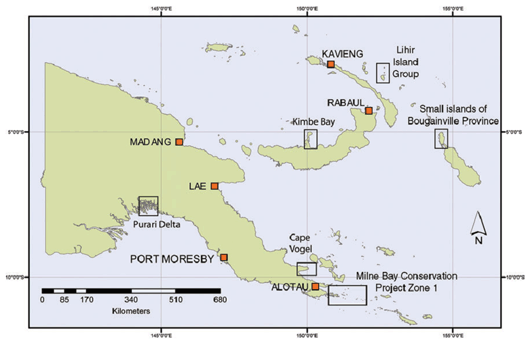Papua New Guinea (PNG)
Coastal, small island, and coral reef ecosystems
Contact Information
- Colin Filer
Resource Management in Asia-Pacific
Research School of Pacific and Asian Studies
Australian National University
Canberra ACT 0200
Australia
colin.filer@anu.edu.au
Project team and institutions
This assessment was undertaken by a team of scientists coordinated by
the Australian National University and the University of Papua New
Guinea. The first phase of the assessment (completed in 2005) was a
nationwide survey of the relationship between coastal communities and
coastal ecosystems, with a number of local-level case studies of this
relationship. The second phase (due for completion in 2007) will focus
on community-based assessments in one of the case study areas. This
second phase is an integral component of the Milne Bay Community-Based
Coastal and Marine Conservation Project (MBCP), which is being
implemented by UNDP and executed by Conservation International. This
project has its own Steering Committee with representation from a
variety of stakeholders.
Funding
The MA provided financial support for the first phase of this
assessment, including production and dissemination of the national
report. The second phase is funded by UNDP as part of the co-financing
of a grant from the Global Environment Facility.
Time period
The period assessed is 1975–2000. Scenarios are projected until 2020.
Intended audience
National and provincial decision-makers, conservation organizations,
university students, and local communities.
Focus
The main focus of this assessment is population pressure as a driver
of ecosystem change in coastal and small island communities.
Summary of findings

Other significant drivers of change in PNG’s coastal ecosystems are
climate change, tectonic disturbances, the industrial exploitation of
inshore marine resources, and the discharge of industrial and domestic
waste material into coastal waters. The areas selected for local-level
case studies in the first phase of the assessment are intended to
reflect the extent of local variation and the relative significance of
different drivers.
Within the coastal zone, both terrestrial and marine communities are
assessed. Terrestrial communities include ‘‘uncultivated’’ forest
(including sago groves); cultivated land (including bush fallows and
orchards); other ‘‘natural’’ communities (such as grasslands and
wetlands); and towns, villages, and other ‘‘built-up environments.’’
Marine communities include mangrove swamps; coral reefs; seagrass beds;
and unvegetated bottoms. At the national scale, information about the
supply of ecosystem services is primarily arranged by reference to
indigenous food-cropping systems, which are treated as the core
component of local resource management regimes in rural areas. Human
well-being is measured by cash income, access to government services,
and indicators of health, nutrition, and life expectancy.
The two scales of analysis and interpretation in the first phase of
the assessment are the national and local scales, where each of the
local case studies encompasses an area roughly equivalent in size and
population to that of a single local level government in PNG. A
preliminary assessment of the relationship between people and ecosystems
in the area designated as ‘‘Zone 1’’ by the MBCP will count as one of
five local case studies documented in the report of the first phase. In
the second phase, the national and local scales will be replaced by the
provincial and community scales, because the assessment will focus on
the coastal ecosystems of Milne Bay Province (one of 19 provinces in
PNG) and on a number of coastal and small island communities within Zone
1. This phase is known as the Small Islands in Peril Program (SMIP)
because of the preponderance of small island communities in this area.
As a sub-global assessment within the MA process, the Milne Bay SMIP has
four objectives—to:
- build a credible and feasible framework for the collection,
analysis, and synthesis of ecosystem-wide data for decision-making
at the level of the local community and the province as a whole;
- test this framework in community-based assessments of ecosystem
services in the area(s) of interest to the MBCP;
- address decision-making information needs at the provincial
level by means of scientific analysis, scenario construction, and
policy advice; and
- build capacity to undertake integrated assessments of the
relationship between ecosystems and socioeconomic systems at local,
provincial, and national scales.